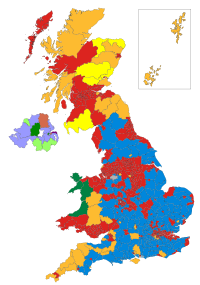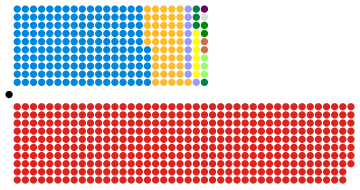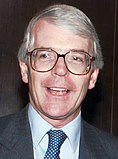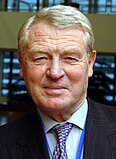 Global Information
Global Information1997 United Kingdom general election information
| |||||||||||||||||||||||||||||||||||||||||||||||||
All 659 seats to the House of Commons 330 seats needed for a majority | |||||||||||||||||||||||||||||||||||||||||||||||||
|---|---|---|---|---|---|---|---|---|---|---|---|---|---|---|---|---|---|---|---|---|---|---|---|---|---|---|---|---|---|---|---|---|---|---|---|---|---|---|---|---|---|---|---|---|---|---|---|---|---|
| Opinion polls | |||||||||||||||||||||||||||||||||||||||||||||||||
| Registered | 43,846,152[1] | ||||||||||||||||||||||||||||||||||||||||||||||||
| Turnout | 71.3% ( | ||||||||||||||||||||||||||||||||||||||||||||||||
| |||||||||||||||||||||||||||||||||||||||||||||||||
 Colours denote the winning party, as shown in the main table of results. * Indicates boundary change, so this is a nominal figure. † Notional 1992 results on new boundaries. | |||||||||||||||||||||||||||||||||||||||||||||||||
 Composition of the House of Commons after the election | |||||||||||||||||||||||||||||||||||||||||||||||||
| |||||||||||||||||||||||||||||||||||||||||||||||||
|
|
|
|
|

The 1997 United Kingdom general election was held on Thursday, 1 May 1997. The governing Conservative Party led by Prime Minister John Major was defeated in a landslide by the Labour Party led by Tony Blair, achieving a 179-seat majority.
The political backdrop of campaigning focused on public opinion towards a change in government. Blair, as Labour Leader, focused on transforming his party through a more centrist policy platform, titled 'New Labour', with promises of devolution referendums for Scotland and Wales, fiscal responsibility, and a decision to nominate more female politicians for election through the use of all-women shortlists from which to choose candidates. Major sought to rebuild public trust in the Conservatives following a series of scandals, including the events of Black Wednesday in 1992,[3] through campaigning on the strength of the economic recovery following the early 1990s recession, but faced divisions within the party over the UK's membership of the European Union.[4]
Opinion polls during campaigning showed strong support for Labour due to Blair's personal popularity,[5][6] and Blair won a personal public endorsement from The Sun newspaper two months before the vote.[7] The final result of the election on 2 May 1997 revealed that Labour had won a landslide majority, making a net gain of 146 seats and winning 43.2% of the vote. 150 Members of Parliament, including 133 Conservatives, lost their seats. The Conservatives, meanwhile, suffered defeat with a net loss of 178 seats, winning 30.7% of the vote. The Liberal Democrats, under the leadership of Paddy Ashdown, made a net gain of 28 seats, winning 16.8% of the vote.
The election ended 18 years of Conservative government, its result the party's worst defeat since 1906; it was left devoid of any MPs outside England, with only 17 MPs north of the Midlands, and with less than 20% of MPs in London.[8] Immediately following the election Major resigned both as Prime Minister and as party leader. Labour's victory, the largest achieved in its history and by any political party in British politics since the Second World War, brought about the party's first of three consecutive terms in power (lasting a total of 13 years), with Blair as the newly appointed Prime Minister. The Liberal Democrats' success in the election, in part due to anti-Conservative tactical voting,[9] strengthened both Ashdown's leadership and the party's position as a strong third party, having won the highest number of seats by any third party since 1929.
Although the Conservatives lost many ministers such as Michael Portillo, Tony Newton, Malcolm Rifkind, Ian Lang and William Waldegrave and controversial MPs such as Neil Hamilton and Jonathan Aitken,[10] some of the Conservative newcomers in this election were future Prime Minister Theresa May, future Chancellor of the Exchequer Philip Hammond, future Leader of the House Andrew Lansley, as well as future Speaker John Bercow. Meanwhile, Labour newcomers included future Cabinet and Shadow Cabinet members Hazel Blears, Ben Bradshaw, Yvette Cooper, Caroline Flint, Barry Gardiner, Alan Johnson, Ruth Kelly, John McDonnell, Stephen Twigg and Rosie Winterton, as well as future Scottish Labour Leader Jim Murphy and future Speaker Lindsay Hoyle. The election of 120 women, including 101 to the Labour benches, came to be seen as a watershed moment in female political representation in the UK.[11]
- ^ "1997 - Registered voters".
- ^ "1995: Major wins Conservative leadership". BBC News. 4 July 1995. Retrieved 26 December 2021.
- ^ "UK Politics - The Major Scandal Sheet". BBC News.
- ^ Miers, David (2004). Britain in the European Union. London: Palgrave Macmillan. pp. 12–36. doi:10.1057/9780230523159_2. ISBN 978-1-4039-0452-2. Retrieved 10 March 2021.
- ^ "The Polls and the British General Election of 1997". www.ipsos.com. Retrieved 10 March 2021.
- ^ "Blair ahead in leadership ratings". BBC News. 3 May 2001. Retrieved 10 March 2021.
- ^ Cite error: The named reference
Labour Sun Endorsewas invoked but never defined (see the help page). - ^ "BBC Politics 97 - Background". www.bbc.co.uk. Retrieved 6 October 2022.
- ^ Hermann, Michael; Munzert, Simon; Selb, Peter (4 November 2015). "The conventional wisdom about tactical voting is wrong". London School of Economics British Politics and Policy blog. London School of Economics. Retrieved 7 July 2020.
- ^ "The Election. The Statistics. How the UK voted on May 1st". BBC Politics 97. BBC News. Retrieved 8 July 2020.
- ^ Harman, Harriet (10 April 2017). "Labour's 1997 victory was a watershed for women but our gains are at risk". The Guardian. Retrieved 8 July 2020.
Cite error: There are <ref group=n> tags on this page, but the references will not show without a {{reflist|group=n}} template (see the help page).


